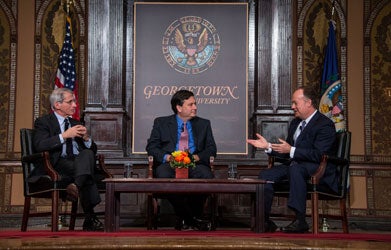Title: NIH Official: Global Health Security Agenda Could Have Tempered Ebola
An implemented global health security agenda could have reduced the severity of the Ebola outbreak in West Africa, said Dr. Anthony Fauci during a talk today at Georgetown with U.S. Ebola czar Ron Klain (C’83) and President John J. DeGioia.
The severity of the Ebola outbreak in West Africa could have been avoided had a global health security agenda been in place, the director of the National Institute of Allergy and Infectious Diseases (NIAID) said today at Georgetown.
“If we had a functional global health security agenda to be able to recognize those first cases [of Ebola] in Guinea in December of 2013, I would say with some degree of confidence that we would not be where we are right now,” said Dr. Anthony Fauci during a conversation at the university with Ebola czar Ron Klain (C’83) and Georgetown President John J. DeGioia. “We would have been able to do the kind of identification, isolation and contact tracing that could have actually put that out.”
He and Klain, recently named United States Ebola response coordinator by President Obama, answered questions from DeGioia and other members of the Georgetown community today as part of the “Ebola: Responding to the Domestic and Global Challenges” event.
Detecting Outbreaks Earlier

From left, National Institute of Allergy And Infectious Diseases Director Dr. Anthony Fauci, United States Ebola Response Coordinator Ron Klain (C’83) and Georgetown President John J. DeGioia discuss the domestic and global challenges in responding to the Ebola crisis.
Klain said the White House has asked Congress for emergency funding that would support a global health security agenda.
“Part of that request is investment in a global health security agenda to build a capacity to detect outbreaks like this earlier in other countries … so we don’t see the kind of escalation that we saw in [Guinea, Liberia and Sierra Leone],” said Klain, who previously served as chief of staff to Vice President Joe Biden and former Vice President Al Gore.
“We have an urgent, urgent challenge that we face as a global community,” DeGioia said at the event. “As a university community, we gather here in moments like this … trying to understand that ever deeper levels of our shared responsibilities to one another.”
Yatta Matilda Musa, a Georgetown student finishing in the first class of the university’s new Master of Science in Global Healthprogram, introduced the panel.
Putting Out Every Ember
“To me, the current Ebola pandemic is a very personal issue,” Musa said. “I am a Sierra Leonian. … My immediate family is still there and this makes me very worried.”
Fauci, who serves as a key advisor to the White House and the U.S. Department of Health and Human Services on emerging infectious disease threats and has fought against such diseases for 30 years, explained that the serious fight against Ebola in West Africa continues.
“If there’s one case that out there, one case can ignite another explosion,” he explained, “so it’s one of those unusual diseases that you have to put every ember and every spark out and we’re far from that now.”
Building Up Infrastructure
This would be a terrible thing if we let the opportunity go by without saying we need to then leave an infrastructure there or the beginning of a direction to an infrastructure to not only prevent Ebola, but [also malaria and tuberculosis] … things there that can be addressed just with a modest turning of the knob.”
—Dr. Anthony Fauci, National Institute of Allergy And Infectious Diseases Director
Fauci also said an important factor in the Ebola outbreak is health care infrastructure, which collapsed in Guinea, Liberia and Sierra Leone and contributed to the spread of the virus.
“I hope if there’s something good that comes out of this is the realization that if you do not have a minimal modicum of a healthcare infrastructure,” said Fauci, “…how cataclysmic a highly lethal disease inserts itself into the community … that lack of infrastructure and ability to do just minimal healthcare type delivery can be so destructive to a society.”
He said that approximately 17,800 people have been infected and more than 6,70 have died of Ebola in the three West African countries.
“This would be a terrible thing if we let the opportunity go by without saying we need to then leave an infrastructure there or the beginning of a direction to an infrastructure to not only prevent Ebola, but [also malaria and tuberculosis] … things there that can be addressed just with a modest turning of the knob,” he said.
Georgetown Community Role
Klain said Georgetown can play an important role in the fight against the Ebola crisis by studying how and why it happened and by staying engaged with those affected.
“Having Yatta here talk about her experience with Sierra Leone and having that experience here in our community … at Georgetown and being a bridge between our community here at Georgetown and those communities is an important part of that,” he said. “More of that interchange will make us better as a community at Georgetown and will make this response in the future a more effective response.”